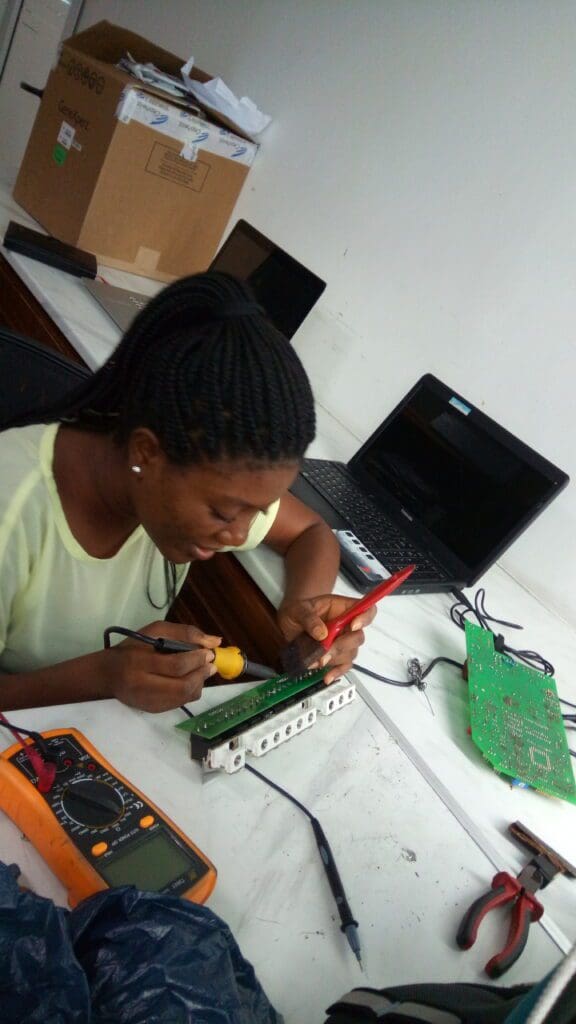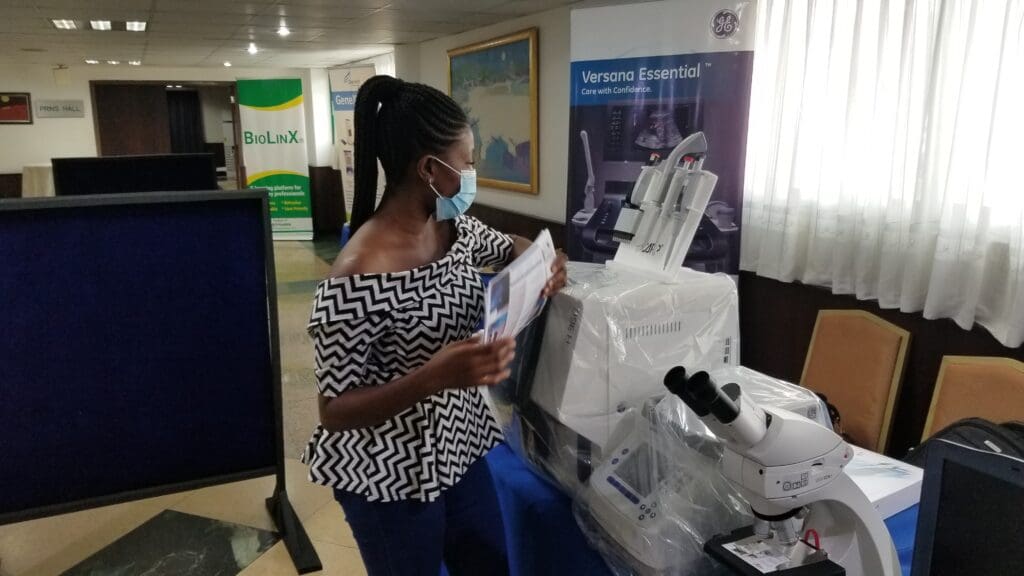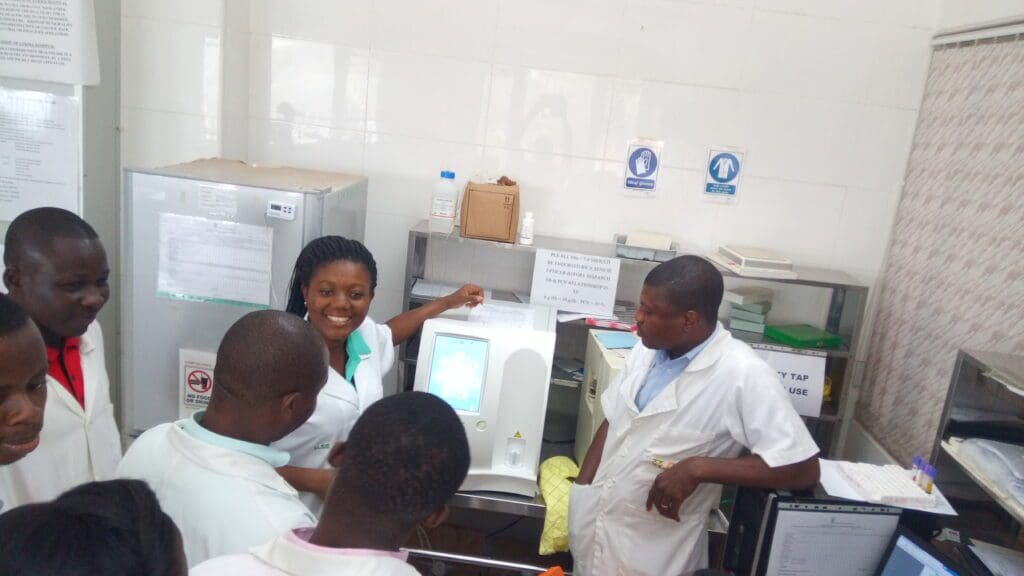Life of a woman Biomedical Engineer and Trainer
Elsie Kafui Ayi is a woman Biomedical Engineer who works on healthcare equipment and devices. She is also involved in training. At the moment, Elsie works for ISN Medical and is based in Ghana.
Meet Elsie Kafui Ayi a Biomedical Engineer and Trainer from Ghana


Background and path to studying engineering
Could you give a brief description of your background and what led you to study and work in medical field service engineering?
I grew up in a home with a jack-of-all trades kind of dad. He is still very handy and fixes small household issues within his capability. Being very close to him, I usually assisted him in repairing our household items and replacing bulbs, sockets, and fuses on countless occasions. Doing this, I subconsciously developed a love for problem solving. So, my journey in engineering began from childhood and spanned through my teenage years. I did not sway from the path when I entered university, but I had now developed an interest in healthcare. Coupled with the pre-existing love I had for engineering; I chose to study Biomedical Engineering at Kwame Nkrumah University of Science and Technology.
Science
Were you interested in science and engineering when you were a child?
Yes, I have always had an interest in science and engineering.
Around the age of nine, I was constantly dismantling toys, and I remember my mom whenever she gave me a new toy threatening that was the last one I was ever getting. I would still curiously disassemble whatever I was given. It didn’t matter what it was. It could be a doll, a toy car, a remote-control toy or anything. Anything that appealed to my curious mind got disassembled. Most often, I was unable to re-assemble the parts which landed me in hot waters.
In my teenage years, I realised that dismantling an item was not the problem. The real challenge was to study the disassembly process and successfully rebuild the item again. My curiosity now made more meaning and influenced General Science as my major in Senior High School. Even during my vacations in High School, I kept helping my father in repairing our household items.
Inspiration for working as a woman biomedical engineer
Was there anyone in your family who guided you towards engineering and working as a woman biomedical engineer?
Yes, my dad. He rarely chastised me for ‘destroying’ my toys. He would rather buy me new toys to replace the ones I spoilt and have me promise that I will not destroy them anymore.
Has there been a particular person who has inspired you at university or at work?
Yes, my former supervisor at work, Mr. Emmanuel Attah. His love for his work and meticulousness was very inspiring.
Is there anyone else who has been an inspiration?
My faith in the Spirit of God has been my greatest inspiration and help. My family and friends have also been very supportive.


Types of equipment
Could you outline the types of equipment you have worked on during your career so far?
I have worked on a range of equipment including:
Chemistry analysers
Haematology analysers
Electrolyte and blood gas analysers
Coagulation analysers
Immunoassay
Centrifuges
Medical refrigerators/ Freezers
Biological Safety Cabinets
Microscopes
POC Testing (point-of-care)
Which has been the most interesting piece of equipment to maintain?
I would say chemistry analysers and sequencers.
Which has been the most troublesome?
Haematology analysers.
Their principle of operation is quite simple. They are however very sensitive to dirt, clogs, and foreign particles. Most users are not diligent with the daily maintenance procedures designed to eradicate possible clogging causing frequent equipment malfunction. Thus, with the brand I usually worked on, there were several breakdowns and equipment downtimes.
Most challenging part of the job as a woman biomedical engineer
As a woman biomedical engineer what do you find most challenging when you are working – technical side, people/customers, or logistics (travel etc)?
Customers
What has been your most challenging job in the field?
Customer management. I recall an incident where a piece of equipment was down and all I needed was to replace a specific part to get it up and running. After several weeks, the manufacturer hadn’t supplied us with the part we needed. The customer understandably grew impatient. It took a monumental effort from me to manage the situation and get the customer to appreciate the efforts I was making to get his equipment functional and also to maintain the integrity of my employer.
I have also worked with a few unfriendly and rude customers. Others also underestimated me and doubted my competence simply because I was a woman biomedical engineer.
Have you ever arrived on site and found that it was much easier than you expected? For example, did you ever need to simply switch on a machine?
Yes!!!!
There was an instance where all I had to do was plug the equipment cable to the mains and switch it on. (The client mistook the printer cable for the equipment cable).
Another instance was to simply replace the reagent… the reagent bottle was completely empty.
Working conditions
Is your role ever uncomfortable because of heat, cramped spaces, bad lighting etc?
Yes, there have been times I’ve had to use my phone’s light to work and lie on the ground to have access beneath a piece of equipment. I’ve also had to stand on a swivel chair (because it was the only option available) to get access to an electronic board located on top of the equipment.
How do you manage working and concentrating when there are other people around (possibly asking you questions or when you will be finished)?
Although, it’s not the best environment to work in, I try to keep the conversation centred around the equipment. That way, I get more information on the error history, and it helps me accurately troubleshoot the error.
Other times, I involve the user in the work. Especially those who have great experience and knowledge about the equipment.


Typical day as a woman biomedical engineer and trainer
What’s your typical day like?
I usually report to the office around 8am. First, I check and respond to emails. I update my previously assigned tasks and plan on how best I can go about my pending tasks. Having the right information and tools, I leave for the customer site.
How much of your time is spent engineering on site and how much with admin, training and other tasks?
I handle administrative tasks in the morning so that I have the rest of the day handling equipment issues. I spend the bulk of my day at the customer site either installing equipment, carrying out preventive or corrective maintenance procedures or training the user.
Which other parts of the organisation give you support?
I get a lot of support from my colleague engineers and seniors. My current line manager, Mr Oscar Udu, has also been of great support and exhibits exemplary leadership skills. Also, I work closely and receive support from the sales, logistics, and customer care departments to better coordinate the work process to ensure maximum customer satisfaction.
How much training do you take part in?
I take part in a lot of training. Some requires my physical presence. and some is done online.
I also train the end-users on the equipment installed and give basic training and orientation to newly employed field service engineers and clinical application specialists.
Women engineers
What advice would you give to women biomedical engineers and all those working in field engineering in terms of safety/security/ being out in the field?
I have four pieces of advice:
Your safety should be your priority.
Have no fears outstanding.
Be alert and cautious with your work: watch out for warning signs and hazardous designs in the working environment.
Know exactly where and what equipment you’ll be working on and use the appropriate safety gear- Overalls, PPE, etc.
What are your tips for feeling confident and not out of place?
There are four tips I can share.
Build a strong support system. I have mentors and people I can call on who are ever ready to support.
Keep learning, work smart and work hard. I quickly read about things I’m not conversant with both within and outside my field of expertise. Also, find smarter and easier ways to carry out tasks.
Encourage and never underestimate yourself. I often tell myself that “I am more than able for every task. And I can do all things through Christ who strengthens me”.
Ask and accept honest feedback and criticism from your colleagues.
Women in engineering
The number of women in engineering is increasing. How can this be helped?
I think there are two things which will help.
Firstly, to have more awareness creation on the role and impact of female engineers.
Secondly, mentorship programmes and career coaching for young women with an interest in engineering.
How key is it to have a mentor and a good team supporting each individual engineer?
The role of mentors and a good team cannot be overemphasised in the career of a successful (woman) engineer. Mentors provide guidance, support, greater awareness and opportunities for growth of the mentees.
Individuals having solid backup systems and mentors exude confidence and excellence in their career, having learnt from their mentors.


New biomedical engineers
What advice would you give to someone who has just started their first job as a woman biomedical engineer?
- In the first month
There are four pieces of advice.
Have an open mind. Be ready to embrace an entirely new system, completely different from the school environment.
Have a teachable spirit and attitude.
Ask and accept honest feedback and criticism from your colleagues.
Keep your eyes on your goal and encourage yourself often.
- In the first year
There are three pieces of advice.
Don’t give up no matter how challenging the job may seem. You will soon find your balance.
Connect and build strong networks.
Ask and accept honest feedback and criticism from your colleagues.
The future for you as a woman biomedical engineer
I dream of having a training centre that will train and equip new graduate biomedical engineers (especially women) for the real world.
Further reading
Other Biomedical Engineers share their experience and advice.


Responses